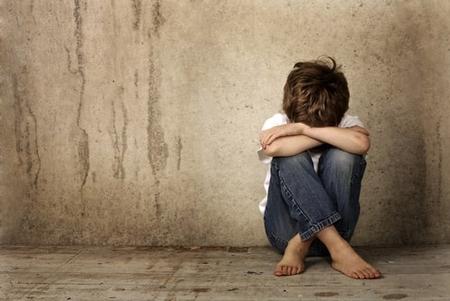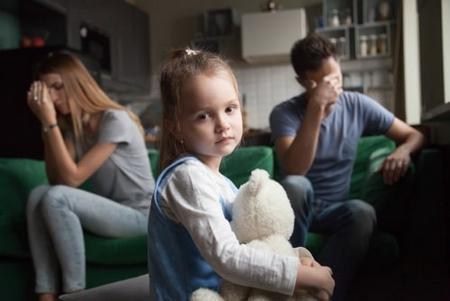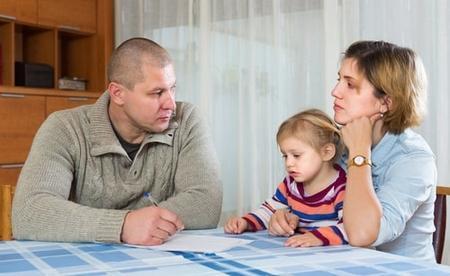Recent Blog Posts
What Happens When Your Co-Parent Abuses Your Child?
 If you are going through a difficult divorce or trying to survive an emotional child custody battle, it can often seem like there is no end in sight. But the situation can be far worse if your spouse is abusive to your child. Signs of abuse may not be clear when you are married and together as a family, perhaps because you are always around to keep an eye on improper behavior, but once your co-parent is alone with your child after the divorce, it may be important to stay alert for signs that different forms of child abuse might be occurring. From there, you can take the appropriate actions to protect your child.
If you are going through a difficult divorce or trying to survive an emotional child custody battle, it can often seem like there is no end in sight. But the situation can be far worse if your spouse is abusive to your child. Signs of abuse may not be clear when you are married and together as a family, perhaps because you are always around to keep an eye on improper behavior, but once your co-parent is alone with your child after the divorce, it may be important to stay alert for signs that different forms of child abuse might be occurring. From there, you can take the appropriate actions to protect your child.
Be Aware of Different Kinds of Child Abuse
Child abuse occurs when a child’s physical or emotional health, development, or well-being are put into jeopardy. It can take many different forms, and the signs are not always immediately obvious. Some types of abuse that you should be aware of include:
What You Should Know About Non-Parent Visitation in Illinois
 Once your divorce is wrapped up, you and your family will embark on new journeys and a brand new way of life. When you and your ex-spouse share children, arrangements for parenting time and the allocation of parental responsibilities must be made, resulting in new routines and a lifestyle that you and your children were not previously accustomed to before the divorce. While these new arrangements can take some getting used to, they often result in happier, healthier homes and habits for you and your children.
Once your divorce is wrapped up, you and your family will embark on new journeys and a brand new way of life. When you and your ex-spouse share children, arrangements for parenting time and the allocation of parental responsibilities must be made, resulting in new routines and a lifestyle that you and your children were not previously accustomed to before the divorce. While these new arrangements can take some getting used to, they often result in happier, healthier homes and habits for you and your children.
Depending on your family situation, however, you may wish to take other people into consideration, such as grandparents, mentors, and close family friends. Who will have visitation rights, and what will those rights look like? How will you determine which non-parents will spend time with your children, and how will you negotiate those parameters?
Stay-at-Home Dads and the Allocation of Parental Responsibilities
 While fathers have always played an important role in the upbringing and development of children, they have not always been treated as such by the courts. This was often due to the assignment of traditional gender roles. Further, it was originally thought that the mother was more critical than the father was in the child’s early years. Yet, as time passed, fathers began to gain important recognition in the lives of their children. The composition of families also started to change. Now, there are fathers who stay home with their children while the mothers work outside of the home. Does this necessarily affect the allocation of parental responsibilities or assignment of parenting time in divorce though?
While fathers have always played an important role in the upbringing and development of children, they have not always been treated as such by the courts. This was often due to the assignment of traditional gender roles. Further, it was originally thought that the mother was more critical than the father was in the child’s early years. Yet, as time passed, fathers began to gain important recognition in the lives of their children. The composition of families also started to change. Now, there are fathers who stay home with their children while the mothers work outside of the home. Does this necessarily affect the allocation of parental responsibilities or assignment of parenting time in divorce though?
How Child-Related Matters Are Determined
In Illinois, divorcing parents are encouraged to negotiate an agreement regarding the allocation of parental responsibilities and the parenting time details of their case. Generally, this offers numerous benefits for families, including the freedom to create a parenting plan that is tailored to meet their family’s specific needs. For example, if the couple feels the child and family would benefit most from the father receiving a greater allocation of parental responsibilities and parenting time because he works from home, they could create and agree upon a parenting plan that reflects this decision.
Can One Lawyer Handle a Divorce for Both Spouses?
 If you have recently made the decision to pursue a divorce, you will probably have many questions. You might wonder how much the process will cost you, how long the proceedings will take, and what you should expect along the way. There is also the issue of hiring an attorney to help you through your divorce. In today’s digitally-connected world, countless online resources offer guidance on handling a divorce without a lawyer, but doing so is not usually a good idea. It is especially dangerous if you and your spouse have children together or have even moderate wealth. Hiring an attorney is the best course of action, but do each of you need a separate lawyer, or can a single lawyer handle the proceedings on behalf of both of you?
If you have recently made the decision to pursue a divorce, you will probably have many questions. You might wonder how much the process will cost you, how long the proceedings will take, and what you should expect along the way. There is also the issue of hiring an attorney to help you through your divorce. In today’s digitally-connected world, countless online resources offer guidance on handling a divorce without a lawyer, but doing so is not usually a good idea. It is especially dangerous if you and your spouse have children together or have even moderate wealth. Hiring an attorney is the best course of action, but do each of you need a separate lawyer, or can a single lawyer handle the proceedings on behalf of both of you?
Conflicting Interests
At its most basic, marriage is a type of contract between you and your spouse, which makes your divorce a legal proceeding to dissolve the marriage contract. Technically, this means that you and your spouse are opposing parties in the case, regardless of how well you get along and whether or not you have reached an agreement regarding the details of your divorce.
4 Tips for Avoiding Mistakes in Parental Responsibility Disputes
 Divorce is hard, no matter what the circumstances are or how “friendly” the divorce may be. Not only is it the end of a marriage, but the finality often hits home over and over again as discussions and negotiations take place regarding a couple’s assets and debts. Who gets the living room set? Who gets the good china? However, the hardest part about divorce typically involves the couple’s children and how parental responsibilities and parenting time are going to be divided.
Divorce is hard, no matter what the circumstances are or how “friendly” the divorce may be. Not only is it the end of a marriage, but the finality often hits home over and over again as discussions and negotiations take place regarding a couple’s assets and debts. Who gets the living room set? Who gets the good china? However, the hardest part about divorce typically involves the couple’s children and how parental responsibilities and parenting time are going to be divided.
When You and the Other Parent Cannot Agree
In the best cases, parents are able to come to an agreement and work out a parenting plan that will serve the best interests of their child while respecting each parent’s rights. In such cases, the court will generally approve the plan presented by the parents. Sometimes, however, the parents cannot agree, and litigation becomes necessary. Unfortunately, litigation has a tendency to turn bitter and contentious, which can be extremely difficult for children to deal with.
Indicators That It Might Be Time to File for Divorce in Illinois
 No one gets married with plans to get divorced. However, a large number of marriages—between 30 and 40 percent, according to recent estimates—fail to stand the test of time. Ending a marriage relationship is the most personal of decisions, and doing so can be incredibly difficult emotionally. Nevertheless, there are many things that may signal that it is time for you to file for a divorce.
No one gets married with plans to get divorced. However, a large number of marriages—between 30 and 40 percent, according to recent estimates—fail to stand the test of time. Ending a marriage relationship is the most personal of decisions, and doing so can be incredibly difficult emotionally. Nevertheless, there are many things that may signal that it is time for you to file for a divorce.
What Are Irreconcilable Differences?
In 2016, the Illinois legislature abolished all fault grounds for divorce in the state. As a result, the only required grounds for divorce are that the marriage has irretrievably broken down due to irreconcilable differences. This basically means that the law recognizes the need for divorce when the marital relationship cannot be saved.
Nobody should have to live in a situation where there is constant bickering or where one or both partners no longer feel connected to each other. If it is difficult to have civil conversations with your spouse, it may be time to consider divorce. Other signs that a divorce may be the best option include infidelity, major substance abuse issues, financial dishonesty, or the simple inability to find joy and happiness in the relationship.
Tips for Creating a Parenting Plan in Your Illinois Divorce
 When you and your spouse decide to get a divorce, there are a large number of decisions that need to be made about the various areas of your family’s lives that will be affected by your split. Perhaps most important for parents of young children is determining how to allocate parental responsibilities. A divorce can be a time of uncertainty for your children, but a strong parenting plan will help them succeed and ensure that both parents play an active role in their lives after the divorce.
When you and your spouse decide to get a divorce, there are a large number of decisions that need to be made about the various areas of your family’s lives that will be affected by your split. Perhaps most important for parents of young children is determining how to allocate parental responsibilities. A divorce can be a time of uncertainty for your children, but a strong parenting plan will help them succeed and ensure that both parents play an active role in their lives after the divorce.
What Is a Parenting Plan?
A parenting plan is an agreement between parents detailing how their children will be cared for after the divorce. This plan is an official part of the divorce decree, and it can help make the transition into post-divorce life as seamless as possible for a child as he or she adjusts to living in two homes and dividing time between parents.
Protect Your Future By Dealing With Debt Before Your Illinois Divorce
 Divorce is an emotionally and financially complex process that affects around 800,000 Americans each year. Sadly, some studies estimate that a person’s net worth could be reduced by as much as 77 percent by the time their divorce decree is finalized. The good news is that this is not always the case. In fact, those who plan and prepare effectively for divorce often fare better than those who do not.
Divorce is an emotionally and financially complex process that affects around 800,000 Americans each year. Sadly, some studies estimate that a person’s net worth could be reduced by as much as 77 percent by the time their divorce decree is finalized. The good news is that this is not always the case. In fact, those who plan and prepare effectively for divorce often fare better than those who do not.
Start by Taking an Honest Look at Your Debt
You may have heard about how important it is to account for all of your assets before your divorce. This is true, of course, but it is often just as important to carefully examine your debt. After all, debt is not going to simply disappear once the divorce is over. Instead, any debt belonging to the marital estate will be distributed between you and your spouse, much like your assets will be. However, there are often additional complexities when it comes to dividing debt. For example, mortgages and other large debts may not be as easy to “split” because the lender or extender of credit may not be willing or able to remove one of you from the account.
Moving On With Your Life After Escaping an Abusive Partner
 Few people expect that they will need to protect themselves from a romantic partner. However, one out of four women and one out of nine men experience domestic violence, accounting for 15 percent of all violent crimes. Victims of domestic violence can take steps to escape an abusive situation by seeking help from an attorney and filing for an order of protection from their partner or spouse. However, even after escaping domestic abuse, many people struggle to move on and rebuild their lives.
Few people expect that they will need to protect themselves from a romantic partner. However, one out of four women and one out of nine men experience domestic violence, accounting for 15 percent of all violent crimes. Victims of domestic violence can take steps to escape an abusive situation by seeking help from an attorney and filing for an order of protection from their partner or spouse. However, even after escaping domestic abuse, many people struggle to move on and rebuild their lives.
What Is an Order of Protection?
An order of protection is a court-issued directive that provides legal protection for victims of domestic violence, abuse, or stalking. An order of protection can include a variety of requirements, including an order to stop the abuse, limits on contact between an abuser and his or her victims, and a requirement for the abuser to move out of a shared home. Having an order of protection in place can provide safety, and an alleged abuser can face serious consequences, including criminal charges, for violating the order. Police will take any domestic calls very seriously when a person has an order of protection in place.
How to Help Your Children Understand and Cope with Your Divorce
 While older children typically understand the concept of divorce, younger children often struggle to grasp how their parents’ divorce will affect their everyday lives. They may not even fully comprehend that divorce means one parent will be living at a different home. Unfortunately, this lack of understanding can make coping with the divorce that much more difficult for the child. If you are considering a divorce, it is important to understand how you can help your child as you and your family go through the divorce process.
While older children typically understand the concept of divorce, younger children often struggle to grasp how their parents’ divorce will affect their everyday lives. They may not even fully comprehend that divorce means one parent will be living at a different home. Unfortunately, this lack of understanding can make coping with the divorce that much more difficult for the child. If you are considering a divorce, it is important to understand how you can help your child as you and your family go through the divorce process.
Talk to Children’s Health Professionals
A mental health professional, such as a child or family therapist, can offer insight into how your child may cope with the divorce, as well as your child’s level of understanding about the process. They can advise you regarding how to best support your child and stay alert for signs that the child is struggling, and they can also meet with your child to help him or her process feelings about the divorce. Your child’s pediatrician can also help you understand how the divorce may affect the child’s physical health and offer guidance regarding how you can continue to provide for your child’s growth and development needs, including adequate sleep and nutrition.











